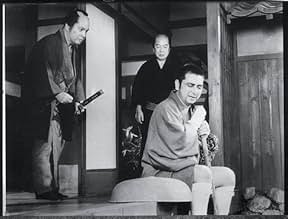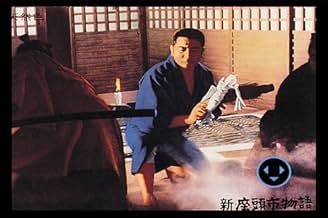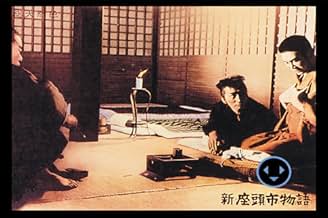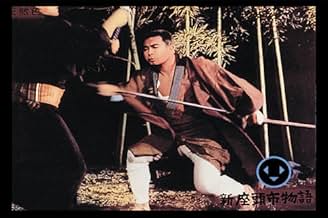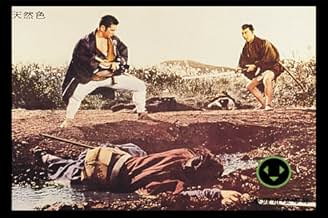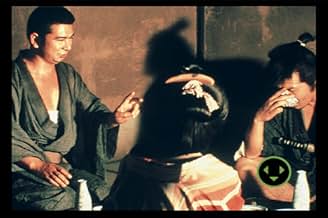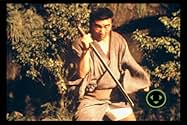AVALIAÇÃO DA IMDb
7,1/10
2,1 mil
SUA AVALIAÇÃO
Adicionar um enredo no seu idiomaZatoichi promises to deliver a maiden safely home but finds two dangerous gangs have a mysterious interest in the young girl.Zatoichi promises to deliver a maiden safely home but finds two dangerous gangs have a mysterious interest in the young girl.Zatoichi promises to deliver a maiden safely home but finds two dangerous gangs have a mysterious interest in the young girl.
- Direção
- Roteiristas
- Artistas
- Direção
- Roteiristas
- Elenco e equipe completos
- Produção, bilheteria e muito mais no IMDbPro
Avaliações em destaque
Fierce fighter, but humble, deferential to a fault, carefully rewards goodness only when he cannot be thanked, protective of innocents --- much like our finest cowboy heroes (Shane, Coop in Noon, Clint).
My wife likes The Shield for the same reasons she likes Hollywood's version of Cosa Nostra: protect the innocent, swiftly and without recourse punish the guilty.
If Michael Corleone ran the justice system, would O.J. be playing golf? Would the beaten, threatened common-law wife be turned away from the police station with "until he actually kills you, the ACLU won't allow us to do anything?"
Just saw the first sequel episode, #2. The print I found appears to be a crude chop job by Janus Films, that marketer having rudely hacked off the correct ending.
My wife likes The Shield for the same reasons she likes Hollywood's version of Cosa Nostra: protect the innocent, swiftly and without recourse punish the guilty.
If Michael Corleone ran the justice system, would O.J. be playing golf? Would the beaten, threatened common-law wife be turned away from the police station with "until he actually kills you, the ACLU won't allow us to do anything?"
Just saw the first sequel episode, #2. The print I found appears to be a crude chop job by Janus Films, that marketer having rudely hacked off the correct ending.
The following review is an extract from the book "Shintaro Katsu´s Zatoichi: Complete guide to all movies", which is now available on Amazon.
"At the beginning of this film, as a filmic preface, we see how Ichi plays a game of dice (or something similar) with a small group of dishonest opponents. The latter, despite having lost, are not willing to accept defeat, but before they can react, Zatoichi makes them reluctant to even try any hostility against him. With a lightning fast movement of his shikomizue, he cuts a candle that illuminated the room vertically, leaving his opponents astonished, and leaving the room shortly afterwards in the dark (and therefore in relative equality of conditions with others who are able to see). "Darkness is my ally..." says Zatoichi again sheathing his sword in the reed.
The massive duel between the two groups of yakuza recalls by its atmosphere and stylistic characteristics the great Italo-westerns, where a solitary gunman (like Clint Eastwood in Sergio Leone's "Dollar trilogy") must face several enemies at the same time. Leone and other western masters were profusely inspired by the Japanese chambara. The equivalence and parallels between samurais or ronins and solitary cowboys or outlaws are undeniable."
"At the beginning of this film, as a filmic preface, we see how Ichi plays a game of dice (or something similar) with a small group of dishonest opponents. The latter, despite having lost, are not willing to accept defeat, but before they can react, Zatoichi makes them reluctant to even try any hostility against him. With a lightning fast movement of his shikomizue, he cuts a candle that illuminated the room vertically, leaving his opponents astonished, and leaving the room shortly afterwards in the dark (and therefore in relative equality of conditions with others who are able to see). "Darkness is my ally..." says Zatoichi again sheathing his sword in the reed.
The massive duel between the two groups of yakuza recalls by its atmosphere and stylistic characteristics the great Italo-westerns, where a solitary gunman (like Clint Eastwood in Sergio Leone's "Dollar trilogy") must face several enemies at the same time. Leone and other western masters were profusely inspired by the Japanese chambara. The equivalence and parallels between samurais or ronins and solitary cowboys or outlaws are undeniable."
Further episodic adventures through the dark corners and seedy streets of feudal Japan with the jolly, opportunistic blind samurai. In this installment, Zatoichi runs afoul of a conniving widow, escorts a wealthy heiress home from danger and, once again, gets caught up in the middle of a large-scale conflict between bickering gangs. Just another day at the office for Ichi, who's perfectly willing to go with the flow so long as he finishes the day with a full belly and a roof over his head.
After five adventures, I've begun to recognize the character's favorite, and most reliable, tricks. Joking and groveling, downplaying his own capabilities to remain incognito and catch future opponents unaware. Leaning on his expertise as a masseuse (a job which was forbidden to sighted people at the time) to access private rooms and important people, skirting the muscle of an organization to slash directly at its head. Wolfing down his food and constantly talking with his mouth full... actually, I haven't quite worked out why he does that yet. He's also prone to falling in love with the women under his protection, as is the case with this episode's distressed damsel. Or maybe that's just another of his manipulations, meant to inspire loyalty and obedience when necessary. If so, it serves to save both parties' lives when they're caught in a surprise attack and the slightest hesitation could have been lethal.
In the big picture, On the Road isn't the most meaningful of our hero's adventures. He re-treads some familiar thematic terrain, continues his transition from smaller-scale duels to big group battles, slices up the most deserving bad guys and satisfies his moral code before wandering out of town, unscathed, to darken new horizons. It's an entertaining entry, though, nicely paced and exciting, with a number of well-conceived scenes and overlapped subplots competing for his/our attention. As these Zatoichi pictures go, such attributes can't always be taken for granted.
After five adventures, I've begun to recognize the character's favorite, and most reliable, tricks. Joking and groveling, downplaying his own capabilities to remain incognito and catch future opponents unaware. Leaning on his expertise as a masseuse (a job which was forbidden to sighted people at the time) to access private rooms and important people, skirting the muscle of an organization to slash directly at its head. Wolfing down his food and constantly talking with his mouth full... actually, I haven't quite worked out why he does that yet. He's also prone to falling in love with the women under his protection, as is the case with this episode's distressed damsel. Or maybe that's just another of his manipulations, meant to inspire loyalty and obedience when necessary. If so, it serves to save both parties' lives when they're caught in a surprise attack and the slightest hesitation could have been lethal.
In the big picture, On the Road isn't the most meaningful of our hero's adventures. He re-treads some familiar thematic terrain, continues his transition from smaller-scale duels to big group battles, slices up the most deserving bad guys and satisfies his moral code before wandering out of town, unscathed, to darken new horizons. It's an entertaining entry, though, nicely paced and exciting, with a number of well-conceived scenes and overlapped subplots competing for his/our attention. As these Zatoichi pictures go, such attributes can't always be taken for granted.
This movie had some great sword-fighting sequences, as well as the usual beautiful (but kinda stupid) young woman falling for the blind gambler. I think that the most compelling sequence, though, is where he rescues the young hostage without drawing a sword. There is something about the transformation of the humble blind man to angry, sarcastic avenger that is compelling. It reminds me of those few Columbo episodes where the detective tips his hand early in the episode, for some reason.
This movie would be an excellent introduction to the series.
This movie would be an excellent introduction to the series.
When Zatoichi accidentally met an unknown dying man, who asked him to save an unknown maiden, he felt obligated. He didn't even have to promise. Time and again, he did everything in his power to save the maiden in several occassions. But when he took side on a feudal quarrel, he found himself choosing between which one to honor better: The request of a dying man or the contract he made with one of the gang leaders. You've guessed what he opted. Modern gangsters may have a different code of ethics.
Você sabia?
- CuriosidadesZatoichi's katana is a shikomizue. This is a sword which is concealed within a wooden cane, thus the cane itself is both handle and scabbard.
- Erros de gravaçãoThe string attached to the dragonfly is visible as it lands on a bush next to Zatoichi and Mitsu, who are being attacked, and also when it returns after the fight.
- ConexõesFeatured in Best in Action: 1963 (2019)
Principais escolhas
Faça login para avaliar e ver a lista de recomendações personalizadas
- How long is Zatoichi on the Road?Fornecido pela Alexa
Detalhes
- Data de lançamento
- País de origem
- Idioma
- Também conhecido como
- Zatoichi on the Road
- Empresa de produção
- Consulte mais créditos da empresa na IMDbPro
- Tempo de duração1 hora 25 minutos
- Mixagem de som
- Proporção
- 2.35 : 1
Contribua para esta página
Sugerir uma alteração ou adicionar conteúdo ausente

Principal brecha
By what name was Zatoichi, O Samurai (1963) officially released in India in English?
Responda
